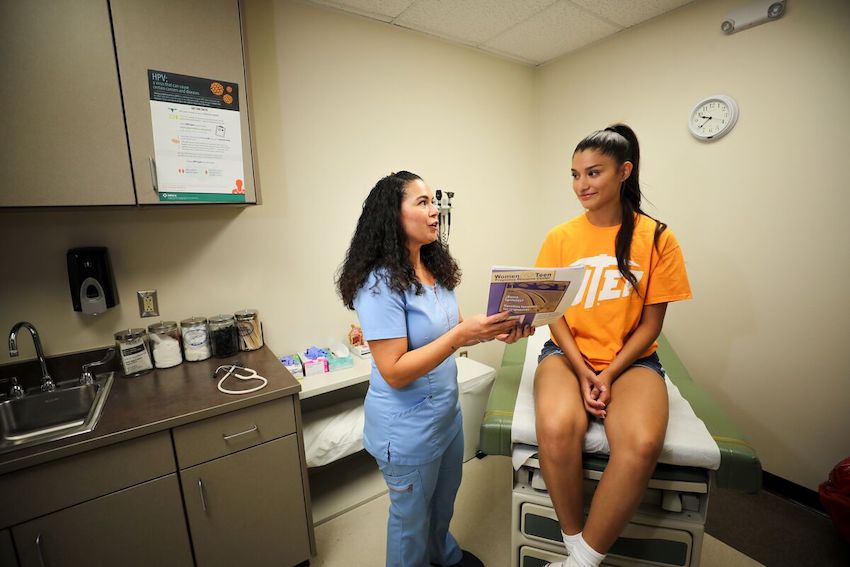Biobehavioral Research Laboratory
The SON’s Biobehavioral Research Laboratory (BbRL) specializes in population-based research focused on studying the biological, behavioral, and environmental pathways that affect health and wellness. The BbRL supports research in health disparities, aging, chronic disease, and environmental health in the College of Nursing.
BbRL’s Mission Statement
- To enhance the health and wellbeing of vulnerable communities by increasing and leveraging our understanding of the underlying mechanisms that connect our biology, behavior, and environment
Areas of Interest
The BbRL supports researchers in the following core areas of research:
- Health disparities in the U.S.-Mexico border region
- Health needs of individuals throughout the lifespan
- Bio-behavioral basis of Chronic health conditions/co-morbidities, symptom science and self-management
- The impact of the COVID-19 pandemic on the healthcare system and on populations of interest
- Environmental health
CAPACITY
The BbRL has three office spaces (122 sq. ft. each), two cubicles for screening (30 sq. ft. each), and four laboratory workstations within the health sciences and nursing building (300 sq. ft. total). It is equipped with the necessary instrumentation to process (e.g., multiplexing assays, automated liquid handler, and hematology analyzer) and store all biological samples (e.g., centrifuges, Class II biological safety cabinet, automated liquid handling chamber, refrigerators, and freezers). The BbRL is composed of one full-time staff members, certified phlebotomists, and multiple research assistants. Through the BbRL Principal Investigators (PIs) have access to office space and computational equipment for research staff made available to the PIs by the College of Nursing (CON) Bio-behavioral Research Lab (BbRL). One full-time staff member is ready to support the PIs during the execution of their studies.
SON Mobile RV Field Laboratory
Investigators also have access to a mobile data collection and transport RV unit that is equipped with bio behavioral data collection capacity and sample collection, storage, and transport capacity. The RV enhances the capacity to collect community-level data while maintaining safety procedures during the COVID-19 Pandemic.
SERVICES
The BbRL also offers collaborative and consulting support to patient-centered outcome research programs interested in conducting human subject health research in the West Texas/Southern New Mexico/Northern Mexico region. The BbRL supports health researchers with the implementation and management of a wide range of clinical, biomedical, and behavioral data collection processes. Our services range from providing minor consulting during the study or protocol design stages to overseeing data collection and data management processes.
Clinical: The laboratory’s clinical infrastructure includes clinical and behavioral examination rooms, phlebotomy stations, and reception areas. The BbRL also manages a mobile clinical lab to support onsite data and sample collection. The BbRL is equipped with the clinical capacity to perform biometric (height, weight, BMI, Glucose, Hemoglobin A1c, lipids), heart rate variability (electrocardiogram), ultrasound arterial wall thickness measurements and retinal microvascular imaging.
Biomedical: The BbRL also has the capacity to collect, process, and store biological samples (e.g., blood, saliva, urine, stool) as well as perform biomarker analysis. The equipment includes -80° freezers, Class III biosafety cabinets, centrifuges, cell incubators, washers, EpMotion 5075 automated liquid handling system, and a Luminex 200 multiplex analyzer. Additionally, the lab has an XN-330 Hematology Analyzer - fully automated 6-part differential hematology analyzer, an Afinion A1c with Printer - HbA1c assays and Cholestech LDX with Printer - measures total cholesterol, HDL cholesterol, triglycerides and glucose
Beyond housing its own fundament biomedical capacity, the BbRL works directly with the Border Biomedical Research Center ( BBRC) to increase its capacity to conduct human subject biomedical research. The BBRC is sponsored by NIH, via a Research Centers in Minority Institutions (RCMI) program G12 grant, and offers state-of-the-art core analytical facilities in Cytometry, Bioinformatics, Biomolecule analysis, Genomic analysis, Community Engagement, and Statistical Consulting.
Behavioral: The BbRL is developing a growing repository of validated self-report instruments programmed in QuestionPro, Red Cap or licensed via third-party vendors. The BBRL instrument repository facilitates the collection and management of self-reported demographic, psychometric, and behavioral data and accelerates study start-up times. The BbRL also has expertise in the conduction of acute stress testing via the Trier Social Stress Test (TSST).
The BbRL also maintains a research toolbox. Free and validated tools available are listed below.
| Purpose | Instrument | # Items | Duration (mins) |
|---|---|---|---|
| Demographic information | Registration Form | 25 | 10 |
| Depression Severity | PHQ-9 | 9 | 5 |
| Depression Symptoms | Moods and Feeling (Short/Long) | 13/33 | 5/10 |
| Family Health History | Family Practice Health History Questionnaire | 150 | 25 |
| General Health | SF-36 | 36 | 15 |
| Adverse Childhood Adversity | ACE | 10 | 5 |
| Cognitive ability and self-enhancement | Overclaiming Questionnaire (OCQ-150) | 150 | 25 |
| Parental Attachment | Inventory of Parent and Peer Attachment (revised) | 75 | 30 |
| Personality | Personality Inventory (TIPI) | 10 | 5 |
| Self-Efficacy | Nursing Student Self-Efficacy Scale | 45 | 25 |
| SES | MacArthur Network | 11 | 5 |
| Social Support | ENRICHED Social Support Instrument | 7 | 5 |








